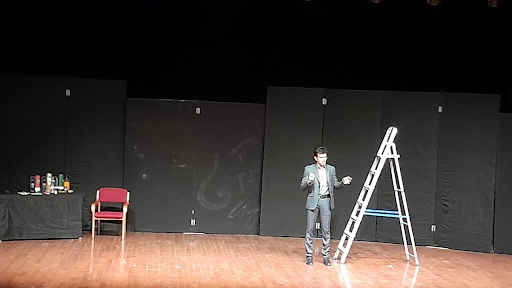One Man 2 Shows
I had the privilege of witnessing Pratik Gandhi's exceptional solo performances at the Zaverchand Meghani Auditorium in Bhavnagar on September 24th, 2023. It was a night filled with incredible storytelling through two Mono Act Plays. These are both plays directed by Manoj Shah.
 |
| Wikipedia: Mohan no Masalo |
 |
| Wikipedia: Hu Chandrakant Bakshi |
Then, in "Hu, Chandrakant Bakhi," Pratik's transformation into the world of Gujarati writer Chandrakant Bakshi was truly impressive. Through witty dialogues and a deep dive into Bakshi's psyche, the play provided a thought-provoking exploration of the writer's creative process and inner conflicts.
In "Hu, Chandrakant Bakshi," a ladder serves as a significant prop. When Chandrakant discusses his literary endeavors, he positions himself atop this ladder. Symbolically, this choice carries two profound meanings:
The 'I' in Self:
The ladder signifies the presence of the self. As Chandrakant ascends it while delving into his literary creations, it symbolizes his personal journey and development as a writer and thinker.
Intellectual Elevation for Literary Understanding:
Beyond representing Chandrakant's personal growth, the ladder conveys the idea that comprehending literature requires elevating one's intellectual perspective. It visually conveys the notion that to grasp the depth of his challenging literary works, individuals must elevate their own intellectual stature, aligning with the profound themes and ideas that often challenged the societal norms of that era.
A common thread between both plays lies in the fact that the central characters find themselves immersed in the societal issues of their respective eras. Coming from privileged backgrounds, they have the privilege and platform to articulate their experiences within the context of their times.
Only a minimal number of props are employed.
Pratik Gandhi's exceptional talent and versatility as an actor shone brightly that evening. These performances not only entertained but also enlightened us about the lives and minds of these influential figures. It was a privilege to be a part of such a remarkable theater, and I'm grateful for the experience.
Thanks to Dr. Dilip Barad sir for making it possible! 🎭
Viewed through the lens of Cultural Studies:
Caste Identity:
When an actor articulates a character's caste identity in their dialogue, it often elicits strong reactions from the audience, characterized by vocal outbursts. This phenomenon underscores the complex social dynamics at play. It's worth exploring whether the audience's reaction remains consistent when a character hails from a lower caste.
Taboo Words:
In our society, certain topics are considered taboo, and open discussions about them are rare. However, when these topics find expression in a theatrical performance, the audience's response is a blend of surprise and acceptance. This juxtaposition highlights the power of the dramatic medium to address subjects often left unspoken.
Elitism:
Both characters in these plays come from backgrounds steeped in privilege, with generations of their forebears belonging to the upper class. This privilege affords them the ability to articulate their experiences and lend voice to their own narratives. Conversely, it raises questions about the challenges faced by individuals from marginalized classes in voicing their own experiences when entrenched class discrimination remains pervasive.
Glimpse of the Play:






.jpeg)



No comments:
Post a Comment